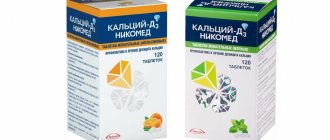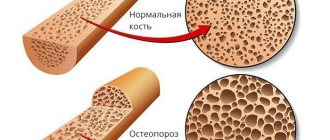Calcium-D3 Nycomed Forte
Calcium-D3 Nycomed forte is a combination drug that contains calcium and cholecalciferol (vitamin D3). This drug belongs to the group of correctors of metabolic processes of bone and cartilage tissue and is used mainly for the prevention and complex treatment of osteoporosis and its complications (increased bone fragility). Recently, the prevalence of osteoporosis has taken on more and more threatening forms: for example, among women over 60 years of age, 30% suffer from this disease, and among women over 80 years of age - 70%. In solving this problem, great importance is attached to disease prevention. A lack of vitamin D in the human body causes a malabsorption of calcium in the intestines, which leads to a violation of its accumulation in the bones, the development of osteoporosis, and, as a result, bone fractures. Vitamin D plays an important role in maintaining skeletal muscle strength and spatial balancing ability, which helps prevent falls and bone fractures. However, it is not always possible to ensure sufficient intake of calcium and vitamin D into the body from natural sources. In such cases, a reasonable way out of the current situation seems to be taking combination drugs containing both of these, which are so important for maintaining the density and integrity of the bone tissue structure. A drug ideal for this is Calcium-D3 Nycomed forte, recommended by the Russian Osteoporosis Association as a drug with the most effective qualitative and quantitative combination of calcium and vitamin D 3. In addition, from the point of view of pharmacoeconomics, Calcium-D3 Nycomed forte is the least expensive drug for long-term prevention of osteoporosis. This drug controls calcium-phosphorus metabolism (primarily in bones, nails, hair, teeth, muscles), suppresses the processes of destruction of bone tissue, increases its density, replenishing the deficiency of calcium and vitamin D3, and plays an important role in the mineralization of teeth. In addition, calcium takes part in the regulation of neuromuscular conduction, initiates muscle contractions, and is an integral part of the blood coagulation system.
Vitamin D3, for its part, promotes the absorption of calcium in the intestines. The use of a combination of calcium + vitamin D3 inhibits the production of parathyroid hormone, produced by the parathyroid glands and stimulating the resorption of bone tissue (leaching of calcium from it). Clinical trials have shown that daily use of 1 tablet of calcium-D3 Nycomed Forte for 3 months in adolescents with osteopenia helps to increase bone mineral density and significantly increase body height and weight. When using the drug by pregnant women, there is a decrease in the symptoms of calcium deficiency. It is important that the drug has virtually no clinically significant side effects, which allows its use during pregnancy and lactation. Calcium-D3 Nycomed forte has a positive effect on calcium-phosphorus metabolism in mother and fetus. It is important to note that the use of the drug in pregnant women in therapeutic doses does not cause premature overgrowth of the fontanel in newborns, because doses of calcium-D3 components Nycomed forte are physiologically justified. In addition to this, taking vitamin D3 helps prevent rickets in children in the first year of life.
Calcium-D3 Nycomed forte is available in the form of chewable tablets with lemon flavor. Vitamin D3 is absorbed in the intestines. Calcium, after getting rid of the “embrace” of the carbonate ion (initially contained in the tablet in the form of calcium carbonate), is absorbed in the proximal part of the small intestine using an active vitamin D-dependent transport mechanism. The tablets are chewed or dissolved, optimally during meals. To prevent osteoporosis, you need to take 1 tablet 2 times a day, as part of the complex treatment of osteoporosis - 1 tablet 2-3 times a day. For deficiency conditions associated with a lack of calcium and vitamin D, adults and children over 12 years old are recommended to take 2 tablets per day, children from 3 to 12 years old - 1 tablet per day.
Calcium-d3 nycomed forte 120 pcs. chewable lemon tablets
pharmachologic effect
Calcium-phosphorus metabolism regulator.
Composition and release form Calcium-d3 nycomed forte 120 pcs. chewable lemon tablets
Tablets - 1 tablet:
- Active components: calcium carbonate - 1250 mg (equivalent to elemental calcium - 500 mg), colecalciferol (vitamin D3) - 10.0 mcg (400 IU) in the form of concentrate * colecalciferol 4.0 mg;
- Auxiliary components: sorbitol - 390 mg, lemon granulate flavor** - 50.7 mg, povidone - 36.4 mg, magnesium stearate - 6.0 mg, aspartame - 1.00 mg.
*colecalciferol concentrate contains, including 10% excess: colecalciferol - 0.011 mg, alpha-tocopherol - 0.044 mg, modified corn starch - 3.214 mg, sucrose - 0.77 mg, sodium ascorbate - 0.176 mg, medium chain triglycerides - 0.134 mg, silicon dioxide - 0.053 mg.
**Lemon flavoring granules contain: isomalt - 49.9 mg, lemon flavoring - 0.76 mg, mono and diglycerides of fatty acids - 0.0006 mg.
30, 60 or 120 tablets in a bottle made of high-density polyethylene, sealed with a screw cap, under which there is a ring for tearing off the sealing gasket, ensuring first opening control.
1 bottle along with instructions for use is placed in a cardboard pack.
Description of the dosage form
Round, biconvex tablets, white, with lemon flavor. May have small inclusions of grayish color and uneven edges.
Directions for use and doses
Calcium-D3 Nycomed is taken orally.
The tablets can be chewed or dissolved and taken with meals.
Adults: in complex therapy of osteoporosis - 1 tablet 2-3 times a day, for the prevention of osteoporosis - 1 tablet 2 times a day.
For calcium and vitamin D3 deficiency:
- Adults and children over 12 years old - 1 tablet 2 times a day.
- Children from 5 to 12 years: 1-2 tablets per day.
- Children from 3 to 5 years of age - dosage in accordance with the doctor’s recommendations.
Special patient groups
Patients with impaired liver function:
No dose adjustment is required.
Patients with impaired renal function:
The drug Calcium-Dz Nycomed should not be used in case of severe renal failure.
Elderly patients:
The dose is the same as for adults. A possible decrease in creatinine clearance should be taken into account.
Duration of treatment
When used for prevention and in comilex therapy of osteoporosis, the duration of treatment is determined by the doctor individually.
When used to replenish calcium and vitamin D3 deficiency, the average duration of treatment is at least 4-6 weeks. The number of repeat courses during the year is determined individually.
Pharmacodynamics
A combined drug that regulates the exchange of calcium and phosphorus in the body (bones, teeth, nails, hair, muscles). Reduces resorption (resorption) and increases bone density, replenishing the lack of calcium and vitamin O in the body, necessary for the mineralization of teeth. Calcium is involved in the regulation of nerve conduction, muscle contractions, hormone production and is a component of the blood coagulation system.
Adequate calcium intake is especially important during growth, pregnancy and lactation.
Vitamin D3 increases calcium absorption in the intestines.
The use of calcium and vitamin D3 prevents an increase in the production of parathyroid hormone (PTH), which is a stimulator of increased bone resorption (leaching of calcium from the bones).
Pharmacokinetics
Calcium
Absorption: Typically, the amount of calcium absorbed from the gastrointestinal tract is approximately 30% of the dose taken.
Distribution and Metabolism: 99% of calcium in the body is concentrated in the rigid structure of bones and teeth. The remaining 1 is found in intra- and extracellular fluids. About 50% of the total calcium content in the blood is in physiologically active ionized form, of which approximately 10% is complexed with citrate, phosphate or other anions, the remaining 40% is associated with proteins, primarily albumin.
Excretion: Calcium is excreted by the intestines, kidneys and sweat glands. Renal excretion depends on glomerular filtration and tubular reabsorption of calcium.
Vitamin D3
Absorption: Vitamin D3 is easily absorbed in the small intestine (about 80% of the dose taken).
Distribution and metabolism: colecalciferol and its metabolites circulate in the blood bound to a specific globulin. Colecalciferol is converted in the liver by hydroxylation to 25-hydroxycolecalciferol. It is then converted in the kidneys to the active form 1,25-hydroxycolecalciferol. 1,25-hydroxycolecalciferol is a metabolite responsible for increasing calcium absorption.
Unmetabolized vitamin D3; deposited in adipose and muscle tissue.
Excretion: Vitamin D3 is excreted by the intestines and kidneys.
Indications for use Calcium-d3 nycomed forte 120 pcs. chewable lemon tablets
Prevention and treatment of calcium and/or vitamin D3 deficiency.
Prevention and complex therapy of osteoporosis and its complications (bone fractures).
Contraindications
- Hypercalcemia (increased concentration of calcium in the blood).
- Hypercalciuria (increased calcium in the urine).
- Nephrolithiasis.
- Hypervitaminosis D3.
- Hypersensitivity to the components of the drug.
- Hypersensitivity to soy or peanuts.
- Severe renal failure.
- Active tuberculosis.
- Sarcoidosis.
The drug in tablet dosage form is not used in children under 3 years of age.
Calcium-Dz Nycomed contains aspartame, which is transformed into phenylalanine in the body. Therefore, the drug should not be taken by patients with phenylketonuria.
The drug contains sorbitol, isomalt and sucrose, so its use is not recommended for patients with hereditary fructose intolerance, glucose-talactose malabsorption or sucrase-isomaltase deficiency.
With caution: pregnancy, lactation, renal failure.
Application of Calcium-d3 nycomed forte 120 pcs. chewable lemon tablets during pregnancy and breastfeeding
Calcium-D3 Nycomed is used during pregnancy to replenish the deficiency of calcium and vitamin D3 in the body. The daily dose during pregnancy should not exceed 1500 mg of calcium and 600 IU of vitamin D3. Hypercalcemia due to overdose during pregnancy can have an adverse effect on the developing fetus.
Calcium-D3 Nycomed is used during lactation. Calcium and vitamin O can pass into breast milk, so it is necessary to take into account the intake of calcium and vitamin D3 from other sources in the mother and child.
special instructions
During long-term therapy, it is necessary to monitor the content of calcium and creatinine in the blood serum. Monitoring is especially important in elderly patients during concomitant treatment with cardiac glycosides and diurstics and in patients with an increased tendency to form kidney stones. In cases of tipercalcemia or signs of renal impairment, reduce the dose or discontinue treatment.
Vitamin D3 should be taken with caution in patients with renal failure. In this case, it is necessary to monitor the calcium and phosphate levels in the blood serum. The risk of soft tissue calcification must also be considered.
To avoid overdose, additional vitamin D3 intake from other sources must be taken into account.
Calcium and vitamin D3 should be used with caution in immobilized patients with osteoporosis due to the risk of hypercalcemia.
Concomitant use of tetracycline or quinolone antibiotics is usually not recommended or should be done with caution.
Impact on the ability to drive vehicles and operate machinery
The drug Calcium-D3 Nycomed does not affect the ability to drive vehicles or work with technically complex mechanisms.
Overdose
Symptoms of overdose (hypercalcemia): anorexia, thirst, polyuria, muscle weakness, nausea, vomiting, constipation, abdominal pain, fatigue, bone pain, mental disorders, nephrocalcic disease, urolithiasis and, in severe cases, cardiac arrhythmias. With long-term use of excessive doses (over 2500 mg of calcium) - kidney damage, soft tissue calcification.
If signs of overdose are detected, you should stop taking calcium and vitamin O, as well as thiazide diuretics and cardiac glycosides, and consult a doctor.
Treatment: gastric lavage, replenishment of fluid loss, use of loop diuretics (for example, furosemide), glucocorticosteroids, calcitonin, bisphosphonates.
It is necessary to monitor the content of electrolytes in the blood plasma, renal function and diuresis.
In severe cases, it is necessary to measure central venous pressure (CVP) and monitor the electrocardiogram (ECG).
Side effects Calcium-d3 nycomed forte 120 pcs. chewable lemon tablets
The frequency of side effects of the drug is assessed as follows: Very common: > 110; Frequent: > 1100, 111000, 1/10 000,
Metabolic and nutritional disorders - Misfortune: hypercalcemia and hypercalciuria.
Gastrointestinal disorders - Rarely: constipation, flatulence, nausea, abdominal pain, diarrhea, dyspepsia.
Skin and subcutaneous tissue disorders - Very rare: itching, rash, urticaria/
Drug interactions
Hypercalcemia may potentiate the toxic effects of cardiac glycosides when used concomitantly with calcium and vitamin D3 supplements. Monitoring of ECG and serum calcium levels is necessary.
Calcium supplements may reduce the absorption of tetracyclines from the gastrointestinal tract. Therefore, tetracycline drugs should be taken at least 2 hours before or 4-6 hours after taking Calcium-D3 Nycomed.
To prevent decreased absorption of bisphosphonate drugs, it is recommended to take them at least an hour before taking Calcium-D3 Nycomed.
Glucocorticosteroids reduce the absorption of calcium, so treatment with glucocorticosteroids may require an increase in the dose of Calcium-D3 Nycomed.
With the simultaneous use of thiazide diurstics, the risk of hypercalcemia increases, as. they increase tubular reabsorption of calcium. When thiazide diuretics are used concomitantly, serum calcium levels should be regularly monitored.
Calcium reduces the effectiveness of levothyroxine by reducing its absorption. The period of time between doses of levothyroxine and Calcium-D3 Nycomed should be at least 4 hours.
The absorption of quinolone antibiotics is reduced when used simultaneously with calcium supplements. Therefore, quinolone antibiotics should be taken 2 hours before or 6 hours after taking Calcium-D3 Nycomed.
Ingestion of foods containing oxalates (sorrel, rhubarb, spinach) and phytin (cereals) reduces the absorption of calcium, so you should not take Cadium-D3 Nycomed within two hours after eating sorrel, rhubarb, spinach, and cereals.







